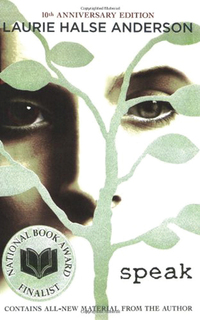I never understood how someone could read a book in one sitting. Sure, there were books that I became addicted to and stayed up reading into the wee hours of the morning. And who hasn’t slinked their way into the soft glow of the refrigerator and snuck off a thin midnight slice of French silk pie? Despite our cravings, treasures such as books and pie are meant to be savored, not gobbled up in one sitting…
I used to think that way until I read Speak, a young adult novel by Laurie Halse Anderson that was also a National Book Award Finalist in 1999. This was the first book that I read in one sitting, and it happened by accident. It was just that engrossing! It’s 198 pages gives the false impression of being a paltry read, but it teems with themes of angst and depression, identity and alienation, past affecting present, trauma, and courage.
Melinda Sordino is a high school freshman in Syracuse, New York, and has recently become a social outcast. She was once a popular, sociable girl, but now her grades are slipping, she dresses differently, and is withdrawn. Ideas abound, but no one knows the real reason why Melinda suddenly “got weird.” She has also become mute, and so the story is carried by her internal monologue, written in a stream-of-consciousness style that is layered with pessimistic humor, fragmented thoughts, and a secret that she simultaneously wants to shout from the top of her lungs, but also wants to forget about.
Despite the fact that we experience everything from inside Melinda’s head, we only slowly discover that she is suffering, in silence, from profound psychological trauma. Melinda is a victim of rape. She feels powerless and ashamed 7 days a week, 5 of which she must endure passing by her attacker in the school hallway, and even sits in some of the same classes. Slowly and painfully, she learns to accept the scars of the past, and to not be ashamed. When Melinda sees the potential danger of her attacker going to prom, she breaks her silence, and it snowballs into a stirring climax and poignant conclusion.
Rape is a difficult thing to write about, especially for young adult readers. Anderson, however, ultimately turns a dark story arc into a story of recovery. Melinda’s character is relatable for anyone who has experienced alienation in high school or adulthood. For those of us who are not victims of sexual assault, Melinda’s story also provides a small window into what victims deal with – the hyperawareness; the insomnia; the isolation; the guilt; the shame; the self-doubt; the crisis of identity; the anger.
If I had to choose one book to hand to the folks who are habitually dismissive of young adult literature, this would be it. If you’re looking for a quick and compelling read, give Speak a try. You can find the print and audio version of the book at the library today.



